Heim >Backend-Entwicklung >PHP8 >Parsen des zugrunde liegenden PHP8-Kernel-Quellcodes – Array (4)
Parsen des zugrunde liegenden PHP8-Kernel-Quellcodes – Array (4)
- 藏色散人nach vorne
- 2021-06-10 15:08:483158Durchsuche
Dieser Artikel stellt Ihnen „Analyse des zugrunde liegenden PHP8-Kernel-Quellcodes – Array (4)“ vor. Es hat einen gewissen Referenzwert. Freunde in Not können sich darauf beziehen. Ich hoffe, es wird für alle hilfreich sein.
Empfohlene verwandte Artikel: „Analyse des PHP8 zugrunde liegenden Kernel-Quellcodes – Array (1)“ „Analyse des PHP8 zugrunde liegenden Kernel-Quellcodes – Array (2)“ „Analyse des PHP8 zugrunde liegenden Kernel-Quellcodes – Array ( 3)"
In Runningprocess wissen wir bereits, dass der Code eine lexikalische Analyse, Syntaxanalyse, Kompilierung und Ausführung von vier Hauptschritten durchlaufen muss
PHP 8 befindet sich in der Kompilierungsphase (wenn der abstrakte AST-Syntaxbaum in Opcode kompiliert wird) und erstellt eine Array-Konstante. Diese Array-Konstante wird, ebenso wie numerische Konstanten und String-Konstanten, während der Kompilierungsphase bestimmt und Speicher zugewiesen. Die Initialisierung des Arrays erfolgt also während der Kompilierungsphase.
Der Array-Initialisierungscodeteil von PHP lautet wie folgt:
//如果开启zend_debug
#if !ZEND_DEBUG && defined(HAVE_BUILTIN_CONSTANT_P)
# define zend_new_array(size) \
(__builtin_constant_p(size) ? \
((((uint32_t)(size)) <= HT_MIN_SIZE) ? \
_zend_new_array_0() \
//走 _zend_new_array_0
: \
_zend_new_array((size)) \
) \
: \
_zend_new_array((size)) \
)
#else
//没有开启 也就是一般模式 走 _zend_new_array
# define zend_new_array(size) \
_zend_new_array(size)
#endif
ZEND_API void ZEND_FASTCALL _zend_hash_init(HashTable *ht, uint32_t nSize, dtor_func_t pDestructor, zend_bool persistent)
{
_zend_hash_init_int(ht, nSize, pDestructor, persistent);
}
ZEND_API HashTable* ZEND_FASTCALL _zend_new_array_0(void)
{ //分配内存空间
HashTable *ht = emalloc(sizeof(HashTable));
//初始化
_zend_hash_init_int(ht, HT_MIN_SIZE, ZVAL_PTR_DTOR, 0);
return ht;
}
//初始化方法
static zend_always_inline void _zend_hash_init_int(HashTable *ht, uint32_t nSize, dtor_func_t pDestructor, zend_bool persistent)
{
GC_SET_REFCOUNT(ht, 1);
GC_TYPE_INFO(ht) = GC_ARRAY | (persistent ? ((GC_PERSISTENT|GC_NOT_COLLECTABLE) << GC_FLAGS_SHIFT) : 0);
HT_FLAGS(ht) = HASH_FLAG_UNINITIALIZED;
ht->nTableMask = HT_MIN_MASK;
HT_SET_DATA_ADDR(ht, &uninitialized_bucket);
ht->nNumUsed = 0;
ht->nNumOfElements = 0;
ht->nInternalPointer = 0;
ht->nNextFreeElement = ZEND_LONG_MIN;
ht->pDestructor = pDestructor;
ht->nTableSize = zend_hash_check_size(nSize);
}
//初始化 bucket 也就是 ardata
ZEND_API void ZEND_FASTCALL zend_hash_real_init(HashTable *ht, zend_bool packed)
{
IS_CONSISTENT(ht);
HT_ASSERT_RC1(ht);
//调用 zend_hash_real_init_ex方法
zend_hash_real_init_ex(ht, packed);
}
//zend_hash_real_init_ex方法
static zend_always_inline void zend_hash_real_init_ex(HashTable *ht, bool packed)
{
HT_ASSERT_RC1(ht);
ZEND_ASSERT(HT_FLAGS(ht) & HASH_FLAG_UNINITIALIZED);
if (packed) {
//如果是packed_array
zend_hash_real_init_packed_ex(ht);
} else {
//如果是 hash_array
zend_hash_real_init_mixed_ex(ht);
}
}
//paced_array 初始化bucket 的代码
static zend_always_inline void zend_hash_real_init_packed_ex(HashTable *ht)
{
void *data;
if (UNEXPECTED(GC_FLAGS(ht) & IS_ARRAY_PERSISTENT)) {
data = pemalloc(HT_SIZE_EX(ht->nTableSize, HT_MIN_MASK), 1);
} else if (EXPECTED(ht->nTableSize == HT_MIN_SIZE)) {
data = emalloc(HT_SIZE_EX(HT_MIN_SIZE, HT_MIN_MASK));
} else {
data = emalloc(HT_SIZE_EX(ht->nTableSize, HT_MIN_MASK));
}
HT_SET_DATA_ADDR(ht, data);
/* Don't overwrite iterator count. */
ht->u.v.flags = HASH_FLAG_PACKED | HASH_FLAG_STATIC_KEYS;
HT_HASH_RESET_PACKED(ht);
}
//hash_array 初始化bucket的代码
static zend_always_inline void zend_hash_real_init_mixed_ex(HashTable *ht)
{
void *data;
uint32_t nSize = ht->nTableSize;
if (UNEXPECTED(GC_FLAGS(ht) & IS_ARRAY_PERSISTENT)) {
data = pemalloc(HT_SIZE_EX(nSize, HT_SIZE_TO_MASK(nSize)), 1);
} else if (EXPECTED(nSize == HT_MIN_SIZE)) {
data = emalloc(HT_SIZE_EX(HT_MIN_SIZE, HT_SIZE_TO_MASK(HT_MIN_SIZE)));
ht->nTableMask = HT_SIZE_TO_MASK(HT_MIN_SIZE);
HT_SET_DATA_ADDR(ht, data);
/* Don't overwrite iterator count. */
ht->u.v.flags = HASH_FLAG_STATIC_KEYS;
#ifdef __SSE2__
do {
__m128i xmm0 = _mm_setzero_si128();
xmm0 = _mm_cmpeq_epi8(xmm0, xmm0);
_mm_storeu_si128((__m128i*)&HT_HASH_EX(data, 0), xmm0);
_mm_storeu_si128((__m128i*)&HT_HASH_EX(data, 4), xmm0);
_mm_storeu_si128((__m128i*)&HT_HASH_EX(data, 8), xmm0);
_mm_storeu_si128((__m128i*)&HT_HASH_EX(data, 12), xmm0);
} while (0);
#elif defined(__aarch64__)
do {
int32x4_t t = vdupq_n_s32(-1);
vst1q_s32((int32_t*)&HT_HASH_EX(data, 0), t);
vst1q_s32((int32_t*)&HT_HASH_EX(data, 4), t);
vst1q_s32((int32_t*)&HT_HASH_EX(data, 8), t);
vst1q_s32((int32_t*)&HT_HASH_EX(data, 12), t);
} while (0);
#else
HT_HASH_EX(data, 0) = -1;
HT_HASH_EX(data, 1) = -1;
HT_HASH_EX(data, 2) = -1;
HT_HASH_EX(data, 3) = -1;
HT_HASH_EX(data, 4) = -1;
HT_HASH_EX(data, 5) = -1;
HT_HASH_EX(data, 6) = -1;
HT_HASH_EX(data, 7) = -1;
HT_HASH_EX(data, 8) = -1;
HT_HASH_EX(data, 9) = -1;
HT_HASH_EX(data, 10) = -1;
HT_HASH_EX(data, 11) = -1;
HT_HASH_EX(data, 12) = -1;
HT_HASH_EX(data, 13) = -1;
HT_HASH_EX(data, 14) = -1;
HT_HASH_EX(data, 15) = -1;
#endif
return;
} else {
data = emalloc(HT_SIZE_EX(nSize, HT_SIZE_TO_MASK(nSize)));
}
ht->nTableMask = HT_SIZE_TO_MASK(nSize);
HT_SET_DATA_ADDR(ht, data);
HT_FLAGS(ht) = HASH_FLAG_STATIC_KEYS;
HT_HASH_RESET(ht);
}
//数组赋值和更新值
static zend_always_inline zval *_zend_hash_index_add_or_update_i(HashTable *ht, zend_ulong h, zval *pData, uint32_t flag)
{
uint32_t nIndex;
uint32_t idx;
Bucket *p;
IS_CONSISTENT(ht);
HT_ASSERT_RC1(ht);
if ((flag & HASH_ADD_NEXT) && h == ZEND_LONG_MIN) {
h = 0;
}
if (HT_FLAGS(ht) & HASH_FLAG_PACKED) {
if (h < ht->nNumUsed) {
p = ht->arData + h;
if (Z_TYPE(p->val) != IS_UNDEF) {
replace:
if (flag & HASH_ADD) {
return NULL;
}
if (ht->pDestructor) {
ht->pDestructor(&p->val);
}
ZVAL_COPY_VALUE(&p->val, pData);
return &p->val;
} else { /* we have to keep the order :( */
goto convert_to_hash;
}
} else if (EXPECTED(h < ht->nTableSize)) {
add_to_packed:
p = ht->arData + h;
/* incremental initialization of empty Buckets */
if ((flag & (HASH_ADD_NEW|HASH_ADD_NEXT)) != (HASH_ADD_NEW|HASH_ADD_NEXT)) {
if (h > ht->nNumUsed) {
Bucket *q = ht->arData + ht->nNumUsed;
while (q != p) {
ZVAL_UNDEF(&q->val);
q++;
}
}
}
ht->nNextFreeElement = ht->nNumUsed = h + 1;
goto add;
} else if ((h >> 1) < ht->nTableSize &&
(ht->nTableSize >> 1) < ht->nNumOfElements) {
zend_hash_packed_grow(ht);
goto add_to_packed;
} else {
if (ht->nNumUsed >= ht->nTableSize) {
ht->nTableSize += ht->nTableSize;
}
convert_to_hash:
zend_hash_packed_to_hash(ht);
}
} else if (HT_FLAGS(ht) & HASH_FLAG_UNINITIALIZED) {
if (h < ht->nTableSize) {
zend_hash_real_init_packed_ex(ht);
goto add_to_packed;
}
zend_hash_real_init_mixed(ht);
} else {
if ((flag & HASH_ADD_NEW) == 0 || ZEND_DEBUG) {
p = zend_hash_index_find_bucket(ht, h);
if (p) {
ZEND_ASSERT((flag & HASH_ADD_NEW) == 0);
goto replace;
}
}
ZEND_HASH_IF_FULL_DO_RESIZE(ht);/* If the Hash table is full, resize it */
}
idx = ht->nNumUsed++;
nIndex = h | ht->nTableMask;
p = ht->arData + idx;
Z_NEXT(p->val) = HT_HASH(ht, nIndex);
HT_HASH(ht, nIndex) = HT_IDX_TO_HASH(idx);
if ((zend_long)h >= ht->nNextFreeElement) {
ht->nNextFreeElement = (zend_long)h < ZEND_LONG_MAX ? h + 1 : ZEND_LONG_MAX;
}
add:
ht->nNumOfElements++;
p->h = h;
p->key = NULL;
ZVAL_COPY_VALUE(&p->val, pData);
return &p->val;
}_zend_hash_init_int Das Flussdiagramm lautet wie folgt: Flussdiagramm der Methode_zend_hash_init_int (Initialisierungs-Hash)
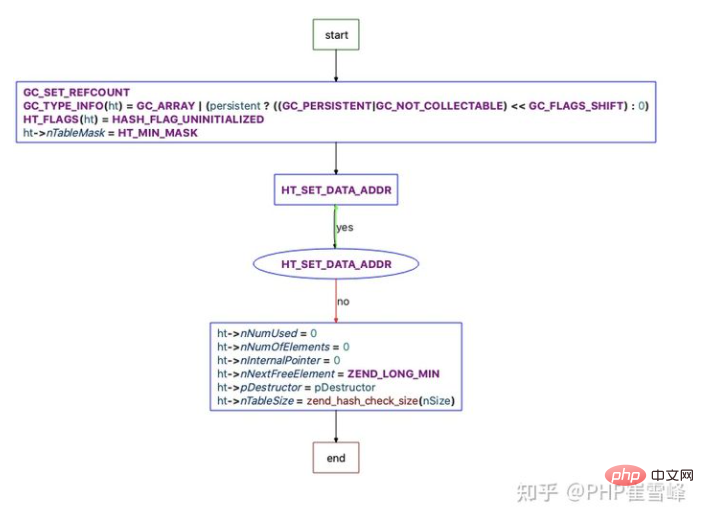
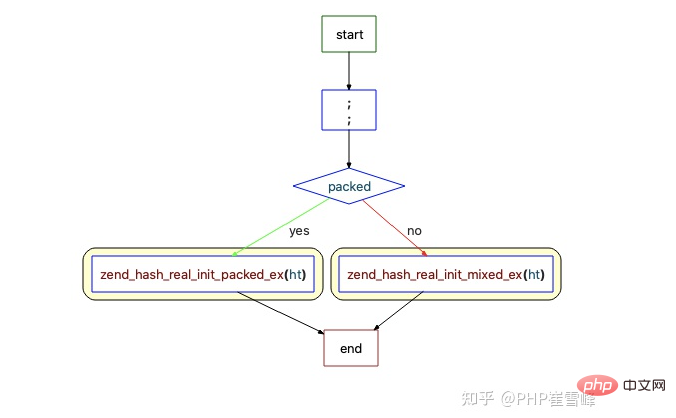 In PHP 8 ist die Initialisierung von Arrays eigentlich in zwei Schritte unterteilt.
In PHP 8 ist die Initialisierung von Arrays eigentlich in zwei Schritte unterteilt. Schritt 2: Jedes Feld der HashTable-Struktur initialisieren
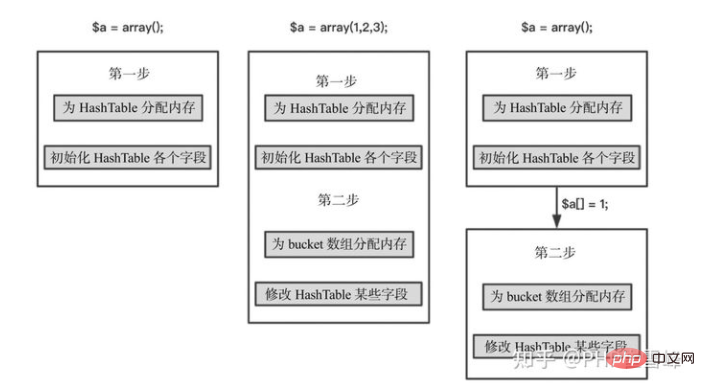
zend_hash_real_init_packed_ex (Bucket-Initialisierungsflussdiagramm, wenn gepacktes_Array)
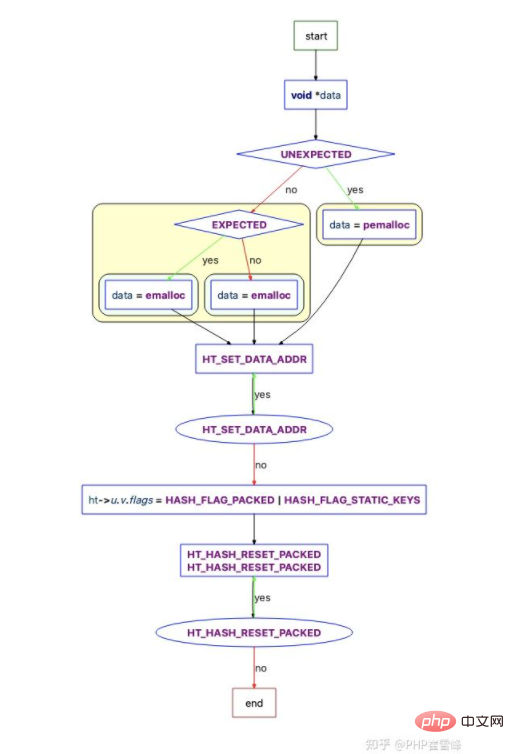
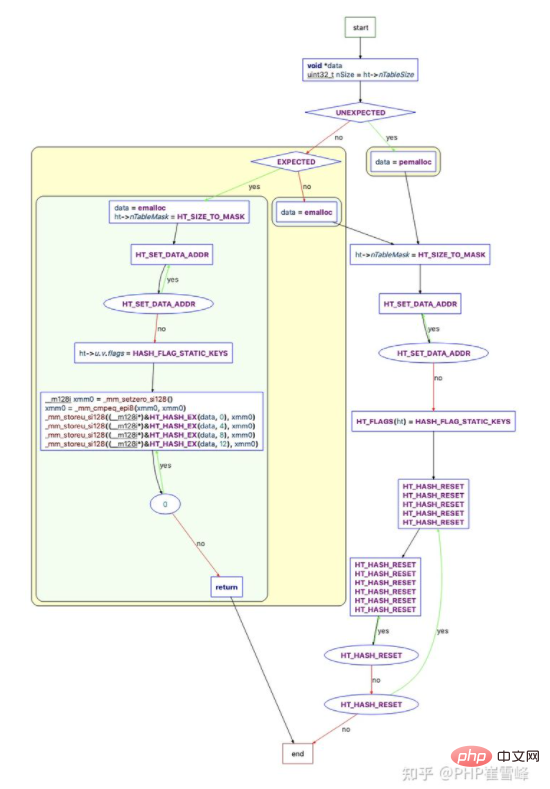
Das obige ist der detaillierte Inhalt vonParsen des zugrunde liegenden PHP8-Kernel-Quellcodes – Array (4). Für weitere Informationen folgen Sie bitte anderen verwandten Artikeln auf der PHP chinesischen Website!
In Verbindung stehende Artikel
Mehr sehen- Lassen Sie uns über einige neue grammatikalische Funktionen von PHP8 sprechen
- Parsen des zugrunde liegenden PHP8-Kernel-Quellcodes – Array (1)
- Parsen des zugrunde liegenden PHP8-Kernel-Quellcodes – Array (2)
- Eingehende Analyse von SAPI, dem zugrunde liegenden Kernel-Quellcode von PHP8 (1)
- Parsen des zugrunde liegenden PHP8-Kernel-Quellcodes – Array (3)

